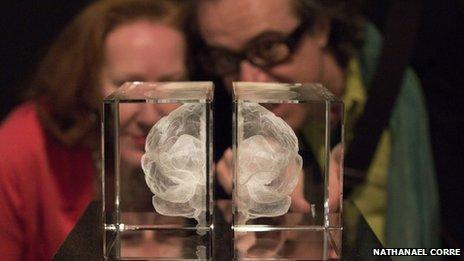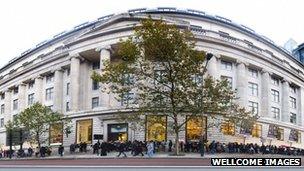Wellcome Collection unveils £17.5m expansion project
- Published

This summer's Brains exhibition has been The Wellcome Collection's most popular ever
The Wellcome Collection in London has unveiled a major £17.5 million expansion project.
The science-based exhibition space and library was originally designed to accommodate 100,000 yearly visits for the "incurably curious".
However the venue has attracted nearly five times that number, with more than two million visitors since opening five years ago.
The project will add 30% more gallery space and double its events capacity.
The Wellcome Collection's most popular exhibition, Brains, saw a 20% rise in visitors over the summer.
Talks and events in its galleries and Wellcome library, exploring the connections between medicine, life and art, are now regularly over-subscribed.
The venue said recent visitor numbers "demonstrate a real hunger for innovative science-based cultural experience that is currently underserved".

The Euston Road venue has attracted nearly five times the number of visitors expected
Work to transform the building on London's Euston Road, by Stirling Prize-winning architects Wilkinson Eyre, will start next summer and is due for completion in summer 2014.
It will see a new thematic gallery and youth events studio, with expansion to the research library and a new restaurant also planned.
The Wellcome Library's Reading Room will also be transformed into a public space, to try and bridge the gap between the library's research community and the general visitors.
'Phenomenal success'
Clare Matterson, the venue's director of medical humanities and engagement, said its "phenomenal success" was a "wonderful affirmation of our conviction that adults are interested and inspired by complex themes that make connections across science, history, art and health".
She added: "Each part of our new development adds to the legacy of Sir Henry Wellcome's intellectual curiosity, his research and collections."
Sir Henry, who died in 1936, was a pharmaceutical pioneer, philanthropist and archaeologist who co-founded a multi-national pharmaceutical company and used his profits to fund medical research.
His artefacts on display at the Collection are some of the hundreds of thousands he had collected during his lifetime, with others on show across more than 100 museums.
An exhibition about sex will open the Wellcome Collection's new thematic gallery in 2014, investigating attitudes, education and cultural perceptions.
- Published28 March 2012